8, Dec 2025
MGM Healthcare Rolls Out Ambulance with ICU-Level Heart–Lung Support
Chennai, Dec 8th: MGM Healthcare, a leading multispecialty hospital in the city, has unveiled its state-of-the-art Mobile ECMO Unit, an advanced emergency service that provides ICU-level heart-and-lung life support and rapid on-site stabilisation for patients in severe cardiac or respiratory failure, significantly improving survival by reducing delays in initiating life-saving care.
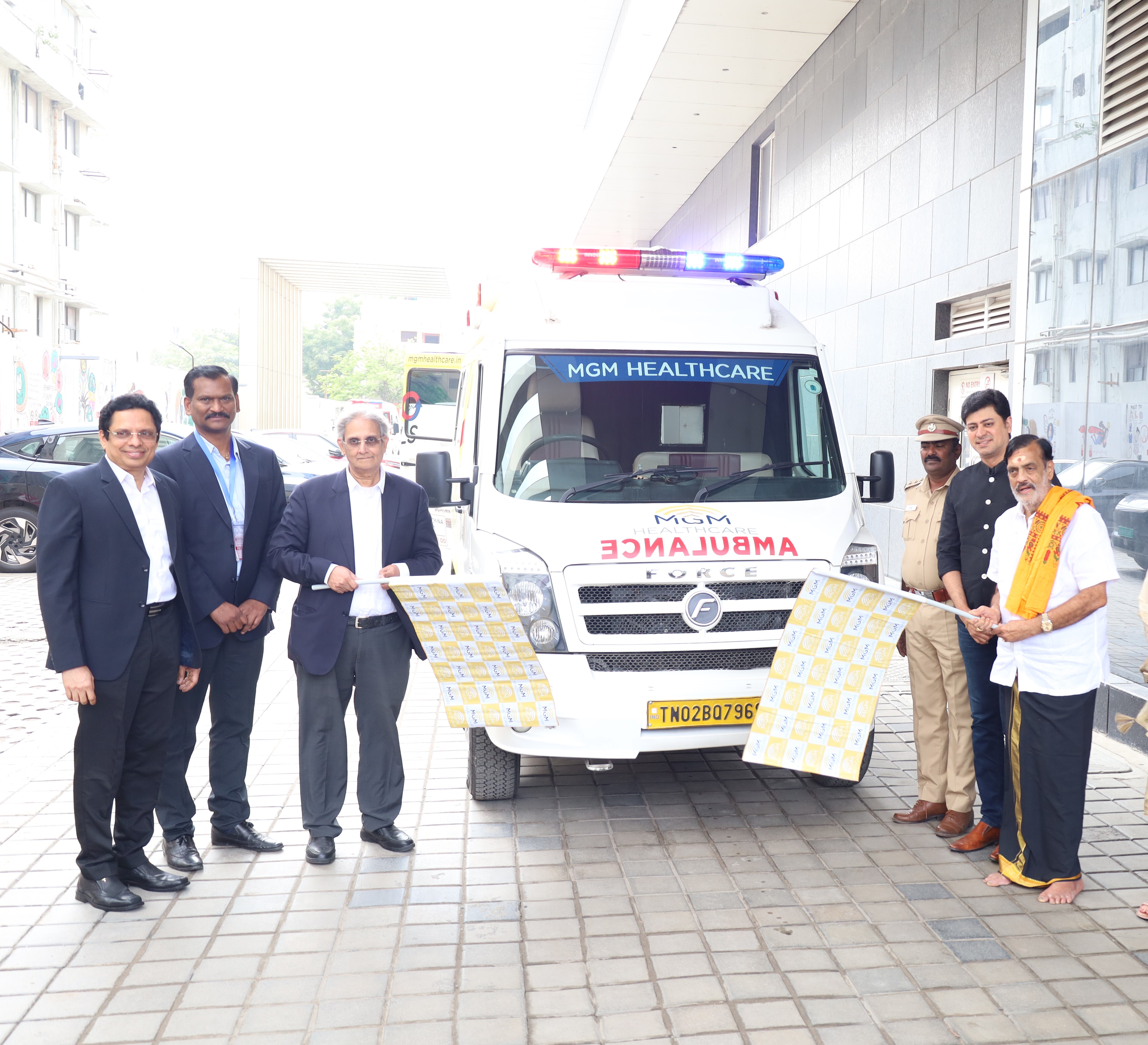
The mobile unit was launched by ACP P.K Ravi, Mr. M.K Mohan, Member of the Legislative Assembly, Anna Nagar Constituency and Dr. Rajesh, Managing trustee, ALERT Foundation, in the presence of Dr. K. R. Balakrishnan, Director of Heart & Lung Transplantation, Dr. Suresh Rao, Co-Director, Institute of Heart & Lung Transplant, and Dr Senathi Nanda Kishore, Clinical Director, Senior Consultant & Clinical Lead, Anaesthesiology and Surgical ICU, MGM Healthcare.
Extracorporeal Membrane Oxygenation (ECMO) is a life-support technique in which blood is circulated outside the body, oxygenated through an artificial lung (membrane), and then pumped back in. ECMO is used when the heart or lungs are so severely impaired that conventional treatments such as medications, ventilators, or CPR can no longer maintain adequate oxygenation or circulation. It is critical in life-threatening conditions such as cardiac arrest, cardiogenic shock, severe heart attacks, massive pulmonary embolism, advanced pneumonia, ARDS, and uncontrolled respiratory failure. Along with the ECMO unit, they also conducted an advanced CME for equipping professionals with emergency and critical care beyond CPR and inotropes.
In his comments, Dr Senathi Nanda Kishore said,
“Timely access to ECMO can be the difference between life and death in cardiopulmonary emergencies. Traditionally, ECMO support has been available only at highly specialised hospitals but there can be delays in reaching them. For patients suffering severe heart or lung failure in remote locations, every minute without adequate oxygenation or circulation raises the risk of irreversible organ damage, brain injury, or cardiac arrest. The new Mobile ECMO Unit bridges that critical gap by bringing advanced heart–lung life support directly to the patient’s location. It is staffed by expert critical-care physicians, perfusionists, and nurses who enable rapid on-site stabilisation and initiation of life-saving therapy even before hospital arrival.”
Dr K R Balakrishnan, said,
“When all other traditional resuscitative strategies have been exhausted, ECMO is the only alternative left to save the life. ECMO is a resource-intensive, high stakes intervention reserved for the sickest patients, designed to provide temporary, life sustaining support in critical moments. Our goal is to provide timely, high-quality ECMO to every patient, wherever they are. By bringing an experienced ECMO team and a fully equipped mobile unit directly to the patient’s bedside, ECMO on Wheels reduces transfer delays, stabilises patients early, and delivers life-saving cardiopulmonary support exactly when it’s needed.”
In his comments, Dr. Suresh Rao said,
“The Mobile ECMO Unit marks a major leap forward in emergency critical care. It allows us to reach patients with severe heart failure, advanced pneumonia, Acute Respiratory Distress Syndrome (ARDS), a severe lung condition causing dangerously low oxygen levels, or pulmonary embolism, a condition of blood clot in the lungs, much faster, initiate life-saving support on-site, and safely transport even the sickest individuals. By extending ICU-level care to remote locations and reducing delays in treatment, this service is set to transform outcomes for patients who would otherwise have little chance of survival.”
- 0
- By Neel Achary
6, Dec 2025
Free Artificial Limb Measurement Camp
For the 19th year Karnataka Marwari Samaj in association with Bhagwan Mahaveer Vikalang Sahayata Samiti (Jaipur Foot) organizing a ‘Free Artificial limb Measurement Camp “. The camp, organized in association with Bhagwan Mahaveer Viklang Sahayata Samiti (BMVSS), will offer free fittings of artificial limbs, calipers, crutches, and other assistive devices. A team of experienced prosthetic and orthotics experts will assess patients and provide personalized care.
The measurement camp will be conducted on Saturday 6th December 2025 at Maharaja Agrasen Bhavan, near Ashoka Pillar, Jayanagar, Bengaluru -560011, Time 8:00 am to 3:00 pm.
Speaking on the announcement Pravin Tulsiyan President KMS said
“committed to serving humanity and empowering differently-abled individuals. This initiative is part of our ongoing efforts to support individuals with disabilities are receiving high-quality artificial limbs and other devices they couldn’t afford before. These camps build community support, raise awareness, and help people regain mobility, improving lives and societal engagement. This initiative offers free medical check-ups, fittings, and ongoing care to enhance quality of life, empowering individuals and making a lasting impact. People from Karnataka and neighboring states are welcome to benefit from this opportunity.”
Sri Bimal Kumar Saraogi, Project Director, Karnataka Marwari Samaj said,
“Each of us has been affected in various ways, and it is imperative that we contribute according to our capabilities to support others. KMS remains unwavering in its social vision and commitment to assisting individuals with disabilities in reclaiming their mobility and dignity. Through the provision of high-quality, durable artificial limbs and other assistive devices, we aim to significantly improve their quality of life.”
6, Dec 2025
WHO Endorses GLP-1 Drugs Like Semaglutide for Obesity, Highlighting Cardiac and Metabolic Benefits
- Cardiovascular health: Major cardiovascular events, heart failure (with preserved ejection fraction), and systolic blood pressure.
- Metabolic & Organ health: Diabetes prevention, kidney diseases, metabolic dysfunction-associated steatohepatitis (MASH), and LDL cholesterol
- Other systemic conditions: Obstructive sleep apnoea, peripheral artery disease, and neurodegenerative diseases
5, Dec 2025
Nutrica Launches Digital Campaign for Bee Honey, Promoting Simple Daily Wellness Habits
India, Nov 5: Nutrica, the lifestyle and wellness brand under BN Agritech Limited, has released a new digital video campaign for Nutrica Bee Honey. The film captures how modern Indian families move through their mornings and how a small, natural habit can quietly support everyday health.
The story is set inside a contemporary home. It follows a family navigating a typical start to the day: breakfast being prepared, parents juggling multiple tasks, and a child gearing up for school. Within this familiar rush, Nutrica Bee Honey appears as a routine that fits effortlessly into the flow. The film draws attention to the honey’s purity, its direct-from-beekeepers sourcing, and its ability to bring clean energy and balance to the morning.
The campaign builds on a simple idea. Wellness is shaped by consistent, everyday choices, not dramatic lifestyle changes. A spoon of honey before a workout, a warm drink for immunity, or a quick boost for an energetic child becomes a steady health ritual. The film positions Nutrica Bee Honey as a trusted family essential that works across ages and routines.
Sparsh Sachar, Director and Business Head, FMCG Vertical, Nutrica, said, “Families today want wellness to be easy, intuitive and part of the life they already lead. They are choosing cleaner ingredients and products that genuinely add value to their day. Nutrica Bee Honey sits at the heart of that shift. Its purity, traceable sourcing and nutritional profile make it a simple everyday choice with real benefits for energy, fitness and immunity. With this campaign, we wanted to show honey the way families actually use it, as a dependable part of their daily rhythm.”
Nutrica Bee Honey is available in three variants designed for specific everyday needs and is retailed across 14 cities including Delhi, Mumbai, Pune, and Chandigarh. Multifloral delivers a natural energy lift. Lemon supports morning fitness and weight-management routines. Tulsi strengthens immunity and offers comfort during cough, cold and seasonal changes.
21, Nov 2025
Sarvodaya Hospital Performs India’s First Bilateral Hip Replacement in 165-kg Young Patient
India, Nov 21: In a landmark achievement that underscores its leadership in advanced orthopaedic care, Sarvodaya Hospital, Sec 8, Faridabad, has successfully treated a highly complex case of bilateral Avascular Necrosis (AVN) of the hip in a 27-year-old patient weighing 165 kg.
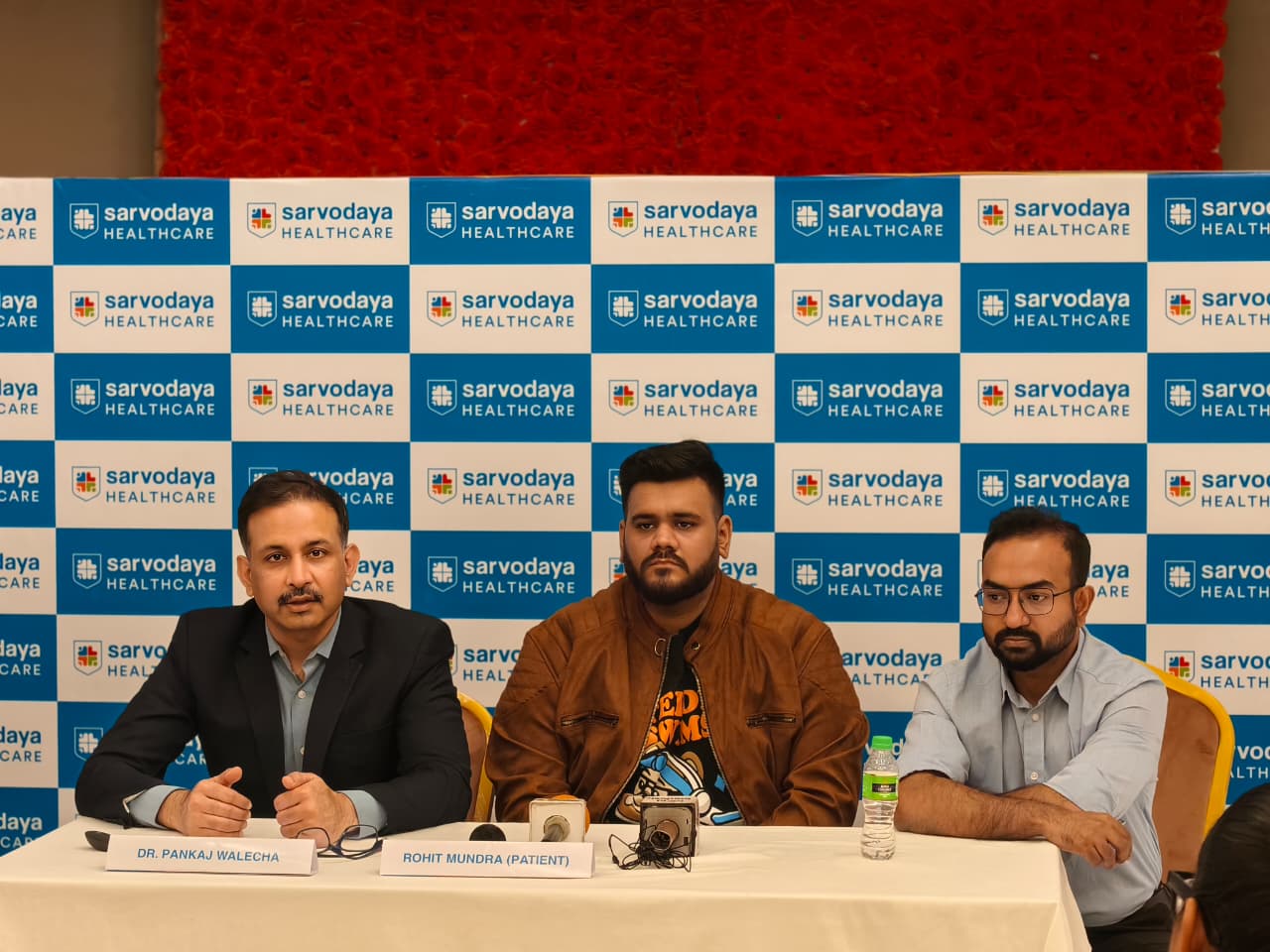
Rohit Mundra, a young professional from Kolkata, was suffering from severe AVN in both hips – an increasingly common condition in younger Indians that severely restricts mobility and affects long-term quality of life. Compounded by class III obesity (BMI 49.2), which represents the most severe category of obesity and is associated with significant health risks like type 2 diabetes, cardiovascular disease, hypertension, sleep, osteoarthritis, and certain cancers, while also experiencing challenges such as reduced mobility and psychosocial stress. His case posed significant surgical challenges that only a high-expertise centre could address.
The patient successfully underwent hip replacement surgery on one side last year. Encouraged by his recovery and the exceptional expertise of the medical team, in 2025 he returned for the replacement of the second hip. This procedure has now been completed with equal success, further underscoring the team’s commitment to delivering advanced care and restoring mobility for patients.
Speaking about the case, Dr. Pankaj Walecha, Director & Head Robotic Knee & Minimally Invasive Hip Replacement, Sarvodaya Hospital, Faridabad, said, “Such cases demand exceptional experience and a specialised ecosystem. A 165-kg young adult undergoing Total Hip Replacement is not common, and it requires a high level of surgical skill, meticulous planning, and a fully prepared multidisciplinary setup. AVN is rising sharply in younger age groups, and we now see such patients daily in our OPD, coming not only from all across India but also from Bangladesh and Nepal.”
Dr. Pankaj further added that obesity, steroid use, alcohol intake, and delayed diagnosis are major contributors to early hip joint destruction, often making Total Hip Replacement surgery the most effective solution.
Sarvodaya Hospital has emerged as a trusted centre for Minimally Invasive Hip Replacement and complex joint reconstruction, supported by the advanced operation theatres designed for high-risk surgeries, a specialised orthopaedic anaesthesia and critical care team, next-generation imaging and computer-assisted navigation and a rehabilitation program tailored for obese and young patients.
Obesity not only accelerates joint damage but also makes hip replacement technically demanding, requiring advanced expertise, customised implants, and an infrastructure equipped to handle high-risk procedures safely.
This successful outcome reinforces Sarvodaya’s growing reputation for managing challenging orthopaedic cases with precision, safety, and long-term functional results.
19, Nov 2025
SIMS Hospital Saves 29-Year-Old’s Brain, Heart and Leg from Extremely Rare Recurrent Stroke
Chennai, Nov 19: SIMS Hospital recently managed an exceptionally rare case of a 29-year-old man who suffered a recurrent stroke caused by a blood clot in his brain, along with simultaneous clots in his heart and leg. Multi-organ clotting with a second stroke in a young adult is considered an extraordinary medical occurrence.
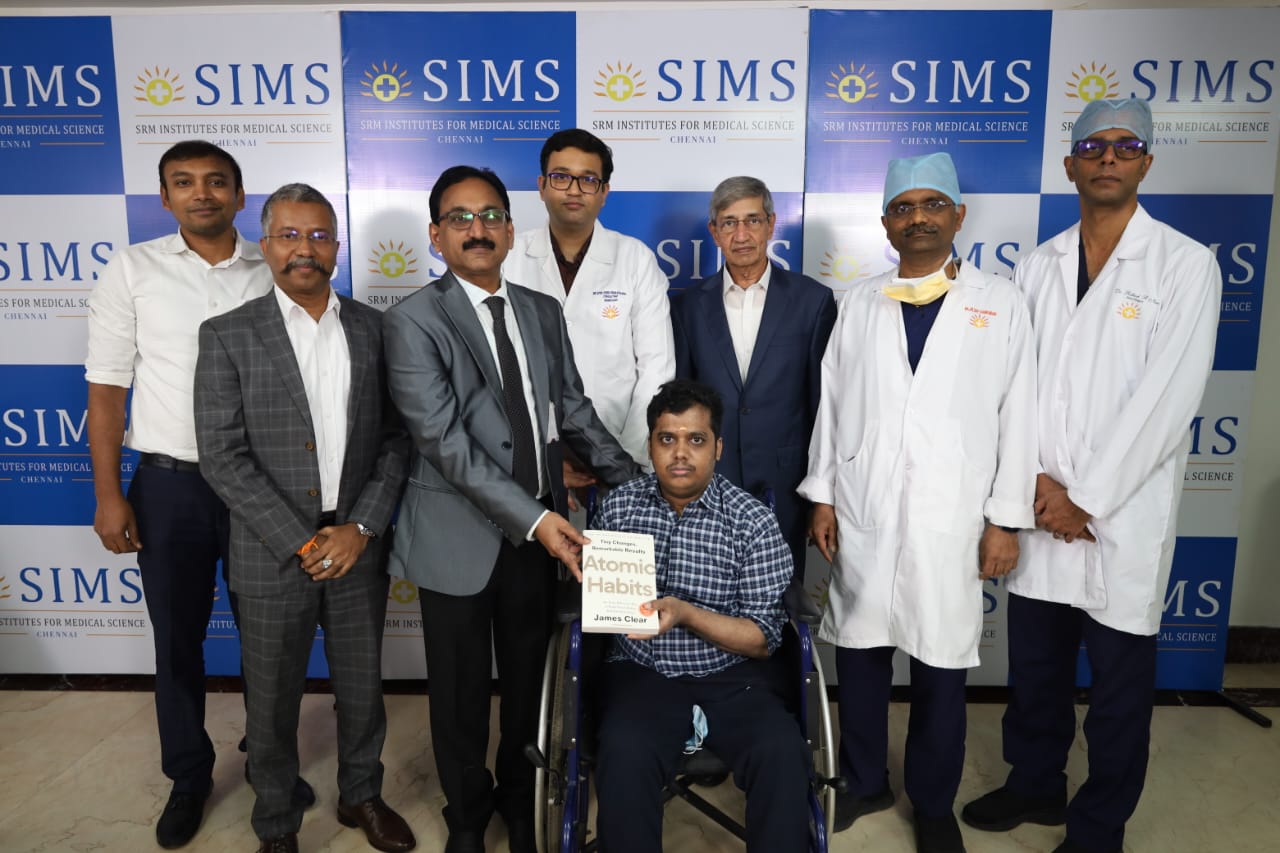
The patient, previously diagnosed with Antiphospholipid Antibody Syndrome (APLA)—an autoimmune condition that increases the risk of abnormal clot formation—had his first stroke at age 26, which required emergency decompression surgery. A short interruption in his regular medication triggered this second, more severe episode. Recognizing early symptoms such as slurred speech, he immediately sought medical attention, which was crucial in preventing permanent damage.
The case was managed by a multidisciplinary team;Dr. Prabash Prabhakaran and Dr. Vivek Iyer (Neurology), Dr. Rithesh R. Nair and Dr. S. Selvin (Interventional Neurology), supported by Dr. Sairam Subramaniam (Vascular and Endovascular Surgery). The patient has been discharged, is stable, and will require lifelong medication with regular follow-up.
Dr. Vivek Iyer, Joint Director of Neurology, commented, “A 29-year-old presenting with a second stroke and clots in three major organ systems is extremely rare. It required a highly coordinated, multidisciplinary approach to manage immediate threats and secure a positive long-term outcome.”
Dr. Prabash Prabhakaran, Director and Senior Consultant, Neurology, emphasized, “Stroke can affect people of any age. This patient’s self-awareness and rapid response were instrumental in his survival. Recognizing early signs and reaching the hospital promptly gave us a critical window to intervene.”
The interventional team performed a surgical thrombectomy to remove the clot from the right femoral artery in his leg while simultaneously administering clot-dissolving medication to clear blockages in the heart and brain. Treating clots in three organs simultaneously is highly complex, as each presents unique risks and requires different treatment strategies.
Dr. Rithesh R. Nair, Director and Senior Consultant, Interventional Neurology, explained, “Our immediate goal was to restore blood flow. Performing thrombectomy in the leg while simultaneously treating the heart and brain clots highlights the advancements in interventional neurology and its ability to manage complex, multi-site clotting events.”
Experts noted that India records 1.6 million new stroke cases annually, with an incidence of 119–145 per 100,000 people. Strokes in individuals below 40 are increasing due to sedentary lifestyles, chronic stress, unhealthy diets, poor sleep, altered blood clotting patterns, and exposure to pollution and microplastics, along with traditional risk factors such as uncontrolled hypertension, diabetes, high cholesterol, smoking, and alcohol consumption.
Modern stroke treatment—including thrombolysis and mechanical thrombectomyhas significantly improved outcomes, allowing restoration of blood flow even in smaller and medium-sized vessels. However, early recognition and rapid hospital arrival remain the most critical factors for survival and recovery.
18, Nov 2025
Singapore-India Collaboration Strengthens Maternal and Child Health Services in Tamil Nadu
Chennai, India, Nov ,18– The Singapore International Foundation (SIF), SingHealth, and the Department of Public Health and Preventive Medicine (DPHPM), Government of Tamil Nadu today marked the conclusion of the second phase of the Enhancing Maternal and Child Health Services (EMCH) Project.
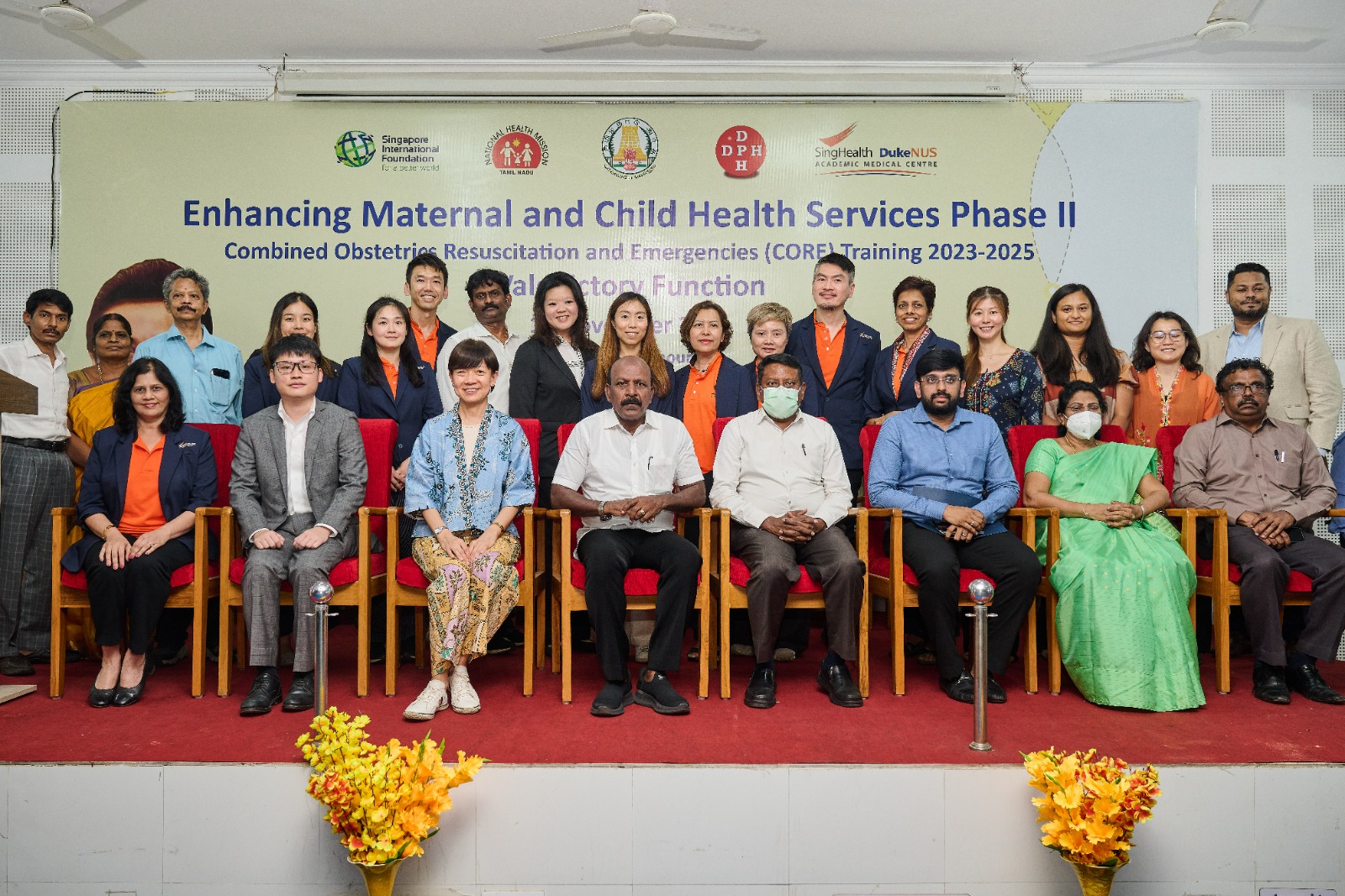
Launched in 2015, the EMCH Project aims to strengthen maternal and child healthcare across Tamil Nadu. Building on the success of the first phase, the current phase (2023–2025) extended its reach to Primary Health Centres, enhancing the management of high-risk pregnancies and neonatal emergencies, and improving outcomes across the state’s maternal and child health system.
15, Nov 2025
VISION 2020 Hosts National Summit on Diabetic Retinopathy; Unveils New Guidelines
India 15th November, 2025:- VISION 2020: The Right to Sight India, announced a comprehensive two-stage program culminating in the National Summit on Diabetic Retinopathy, observed on World Diabetes Day. The key highlight of the summit was to launch the updated, comprehensive guidelines on Management of Diabetic Retinopathy (DR) in India, and foster a nationwide effort to combat diabetes-related vision loss, a rapidly escalating public health challenge in India.
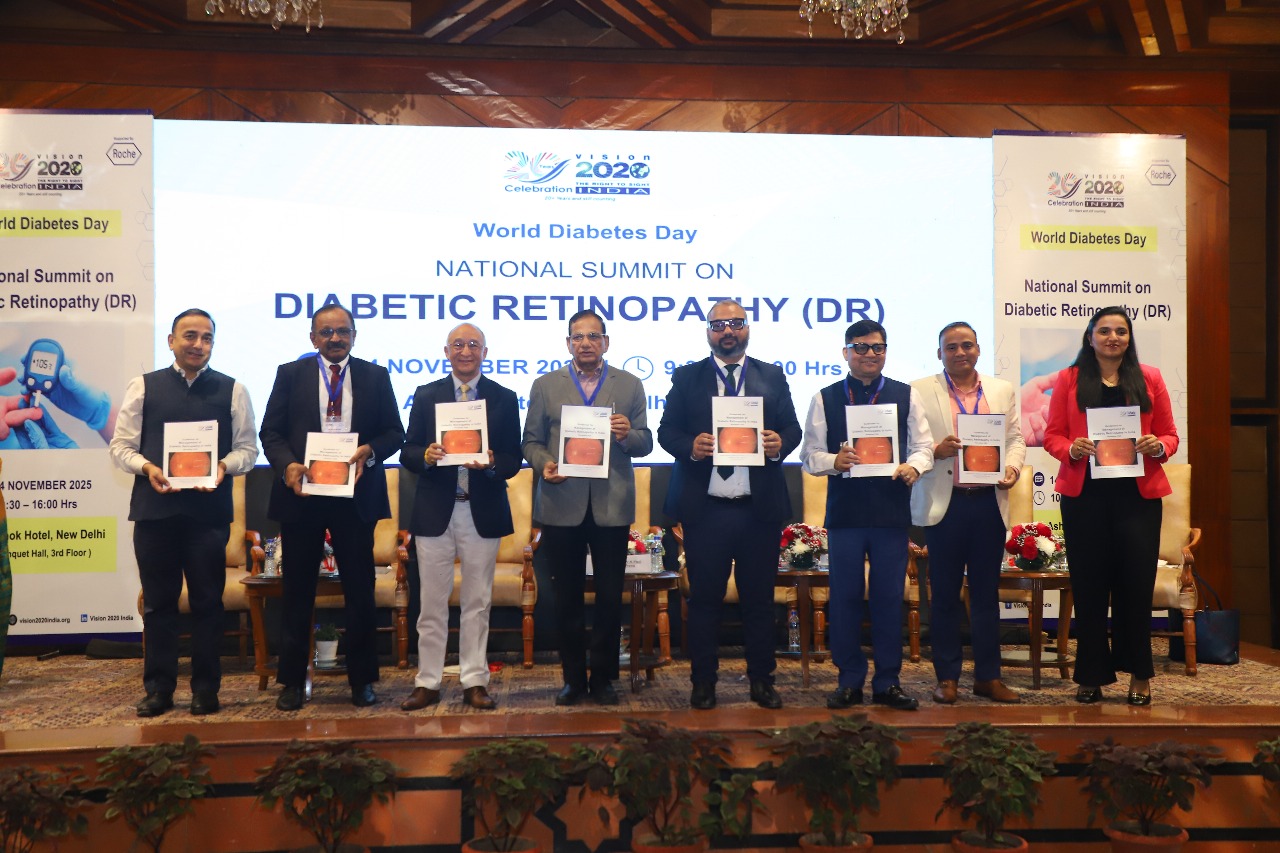
Diabetes Mellitus (DM) is a rapidly escalating public health challenge in India, with over 101 million people currently living with the condition and an additional 21.5 million in the pre-diabetic stage. The number is projected to rise to 109 million by 2035. One of the most serious and sight-threatening complications of diabetes is Diabetic Retinopathy (DR), a microvascular condition affecting the retina and a leading cause of vision loss among working-age adults.
In India, epidemiological data show that DR affects approximately 18% of urban and 10.4% of rural populations with diabetes meaning nearly one in five urban diabetics is at risk of vision impairment. While early detection and timely intervention can prevent blindness in most cases, awareness levels remain low, not only among patients but also among some healthcare practitioners.
With the rising burden of diabetes and its related complications, strengthening awareness, promoting early screening, and updating management guidelines are crucial to reducing the preventable impact of diabetic retinopathy across the country.
As part of this comprehensive two-stage program, two high-level consultations were organized: the World Retina Day Consultation, focused on drafting the new national guidelines, and the World Diabetes Day National Summit, dedicated to policy engagement and public awareness through activities such as an awareness rally and walkathon to encourage regular diabetic screening.
The prestigious one-day National Summit on Diabetic Retinopathy, held on November 14, 2025, in New Delhi, brought together key stakeholders from across sectors including representatives from the Ministry of Health & Family Welfare, non-governmental organizations, industry leaders, and the medical community to drive collaborative action on preventing vision loss caused by diabetic retinopathy.
Distinguished speakers and experts in attendance included Dr. Rajendra P. Joshi, Deputy Director General, Ministry of Health and Family Welfare, Government of India; Dr. V.K. Paul, Member, NITI Aayog; Prof. Praveen Vashist, Dr. R.P. Centre for Ophthalmic Sciences, Dr. J.S. Titiyal, President Elect, AIOS; Dr. Manisha Agarwal, Ophthalmologist/Eye Surgeon, Dr. Shroff’s Charity Eye Hospital, Delhi; Dr. Ranjana Mittal, Senior Consultant – Ophthalmology, Indraprastha Apollo Hospital, New Delhi among others.
Speaking on the occasion, Dr. Rajesh Saini, President, VISION 2020, India, said, “At VISION 2020: The Right to Sight India, our mission has always been to eliminate avoidable blindness and ensure equitable access to quality eye care across the country. The launch of the updated Diabetic Retinopathy guidelines, in collaboration with is a significant stride towards that goal. Diabetic Retinopathy is a growing public health concern, silently threatening the vision of millions. These new guidelines rooted in expert consensus and enriched with the latest diagnostic and management protocols—will empower healthcare providers to detect and intervene earlier, especially in underserved communities. By updating our 2015 DR Manual and aligning it with current best practices, we aim to drive nationwide awareness, strengthen clinical capacity, and reinforce the message that vision loss from diabetes is preventable with timely action.”
The event focused on policy integration strategies to promote early screening and timely intervention for diabetic retinopathy (DR), a leading cause of preventable vision loss among working-age adults. The discussions reflected the incorporation of advanced global standards and technological innovations in screening and treatment, aimed at enhancing early detection and management practices nationwide. This renewed focus underscores a commitment to patient-centric care and collaborative action in addressing the growing burden of diabetes-related eye diseases. Experts at the event emphasized the importance of early diagnosis, timely treatment, and multi-sector partnerships to achieve long-term improvements in eye health outcomes.
Dr. Praveen Vashist, Secretary, VISION 2020, India, stated, “We believe that innovation in healthcare thrives on meaningful collaboration. The updated Diabetic Retinopathy guidelines are a testament to what’s possible when public health institutions, government bodies, and industry leaders like India come together with a shared vision. This partnership ensures that these guidelines are not just clinical documents they are catalysts for systemic change. By aligning with national health priorities and integrating into existing care pathways, we aim to translate these recommendations into real-world impact, especially for vulnerable and underserved populations. Our goal is to ensure that every individual at risk of vision loss due to diabetes has access to timely screening, diagnosis, and care—regardless of geography or socioeconomic status.”
Dr. Monika Puri, Chief Commercial Officer, Roche Products (India) Pvt. Ltd. shared, “Diabetic retinopathy is one of the leading causes of preventable blindness, yet many people remain unaware that timely eye check-ups can save their vision. On World Diabetes Day, I urge everyone living with diabetes to get a simple annual retina screening. Early detection and treatment can protect sight and improve quality of life. Together, we can reduce avoidable vision loss and ensure that every person with diabetes receives the eye care they deserve.”
15, Nov 2025
Sarthak Trust to Host National Abilympics & 12th Disability Conference in Delhi
New Delhi, 15th November 2025: — After successful Regional Abilympics across Chennai, Mumbai, Lucknow, and Guwahati, the much-awaited National Abilympics 2025 and 12th National Conference on Disability (NCD) are set to take place in New Delhi this November. The 12th NCD, organized by Sarthak Educational Trust in collaboration with the National Abilympic Association of India (NAAI) and supported by the Department of Empowerment of Persons with Disabilities (DEPwD), TPCDT, and IndusInd Bank, will be held on November 20–21, 2025, at the Civil Services Officers Institute (CSOI), New Delhi. A 22-member Russian delegation including 10 candidates are participating in the Indian Abilympics competition for the second consecutive year. The initiative emphasizes the significance of expanding support for people with disabilities and fostering bilateral ties between Russia and India in this field.
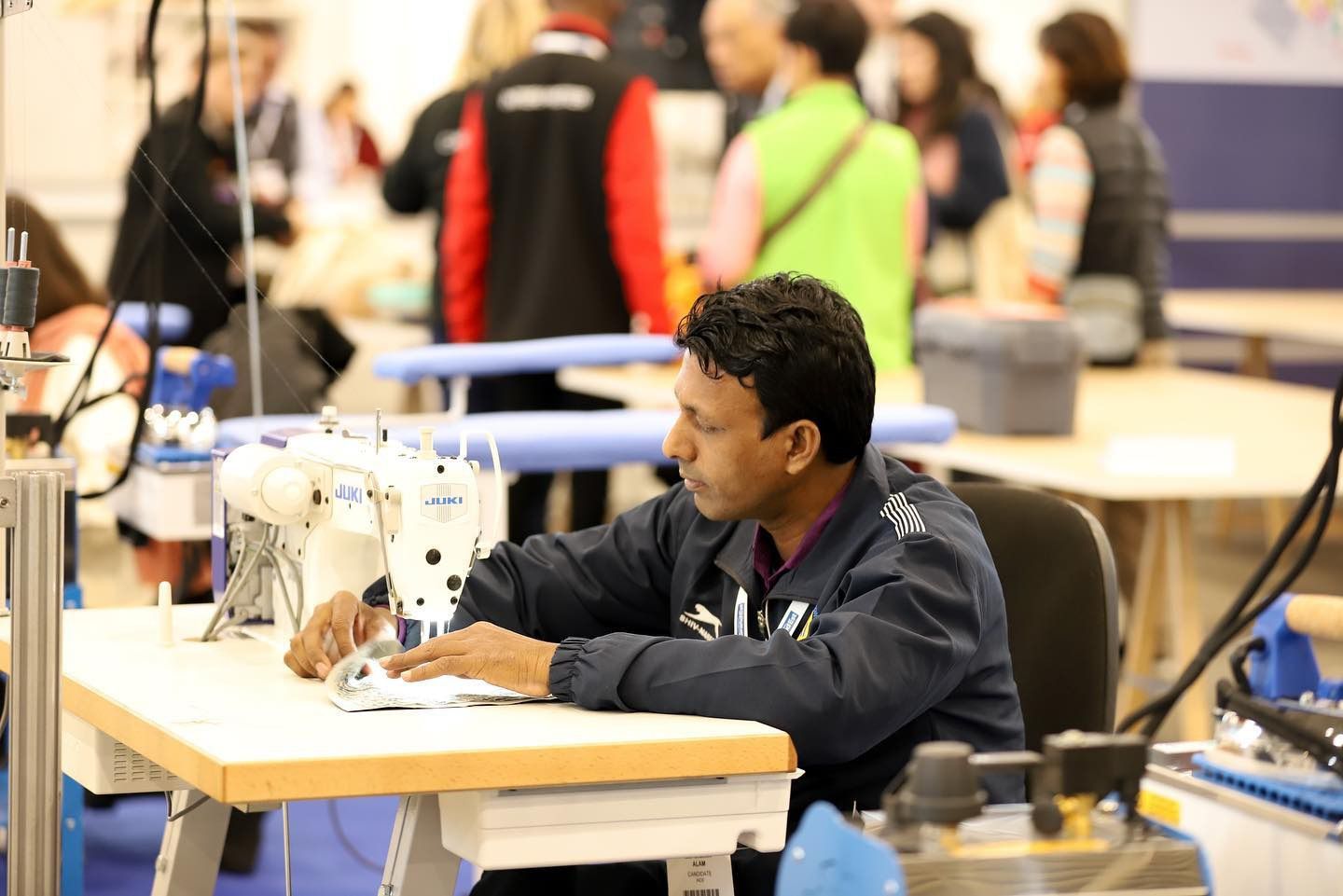
The two day conference will be graced by Shri Ravinder Singh (Indraj), Minister of Social Justice & Welfare for SC & ST, Dr. Vineet Joshi, Chairman, University Grants Commission (UGC), Shri Rajiv Kumar, Former Election Commissioner of India, Ms. Manmeet Kaur Nanda, Additional Secretary of the Department of Empowerment of Persons with Disabilities (DEPwD), Mr. Pradeep Kharola, Director General (DG) of the National Testing Agency (NTA), Shri Himal Tewari, CHRO and Chief CSR & Sustainability, Tata Power, Shri Lov Verma, Former Secretary, Department of Empowerment of Persons with Disabilities (DePwD), Government of India, Shri Krishan Kalra, President, NAAI & Former President, AIMA, Dr. Jitender Aggarwal, Founder & CEO, Sarthak Educational Trust & Secretary General, NAAI, Shri Siddhartha Rastogi, Managing Director, Ambit Asset Management along with other dignitaries. The event will bring together government leaders, corporates, NGOs, media representatives, and persons with disabilities to deliberate on the evolving landscape of inclusion, skill development, and sustainability in India.
Now in its 12th edition, the National Conference on Disability (NCD) has become one of India’s foremost platforms for driving the disability inclusion agenda. Over the years, it has been graced by dignitaries such as Hon’ble Om Birla, Speaker of the Lok Sabha, and the Former Vice President of India, who inaugurated the Sarthak Global Resource Centre during a previous edition. The 2025 conference will be anchored around the theme “Sustainable Development Goals and Disability Inclusion”, focusing on integrating disability perspectives across key SDGs for true inclusive growth.
This year’s agenda includes impactful sessions such as Partnerships for an Inclusive India, Employer Panel on Equal Opportunity, Early Intervention & Inclusive Education, Technology & Innovation for Inclusion, PwD Leaders’ Panel: Voices of Change, and Media & Narratives: Shaping Inclusion.
The event will also feature an Assistive Devices Display, and the release of Sarthak’s Coffee Table Book, making the conference both celebratory and solution-oriented.
The National Abilympics 2025, to be held alongside the conference, will bring together medalists from four regional events South Zone (Chennai), West Zone (Mumbai), North Zone (Lucknow), and East & North East Zone (Guwahati). Over 500 participants from more than 20 states competed across diverse skill categories such as ICT, Crafts, Hospitality, and Services during the regional rounds. These 60+ winners will now compete at the national stage, with the best talents advancing to represent Team India at the 11th International Abilympics 2027 in Finland, widely known as the “Work Skill Olympics” for Persons with Disabilities.
Speaking ahead of the event, Dr. Jitender Aggarwal, Secretary-General of NAAI and Founder & CEO of Sarthak Educational Trust, said, “The National Abilympics and NCD mark not just the culmination of a year-long journey, but a reaffirmation of India’s commitment to inclusion. Through this platform, we’re turning skill into opportunity and opportunity into empowerment. Our mission to train 10 million Persons with Disabilities and facilitate 2 lakh sustainable jobs by 2027 continues to guide every effort we make.”
Over the past year, the regional Abilympics have uncovered inspiring stories of resilience from rural Assam to metropolitan Mumbai showing that skill knows no boundaries. With strong government partnerships and corporate participation, the upcoming national event promises to be a defining moment in India’s journey toward inclusive and sustainable growth for all.
12, Nov 2025
QNET India Launches ‘Sweet Without Guilt?’ Campaign for World Diabetes Day
QNET India Region Launches ‘Sweet Without Guilt?’ Campaign for World Diabetes Day, Promoting Smarter Wellness Choices
Hyderabad, 12th November, 2025: QNET, one of Asia’s leading direct selling companies, has launched a new digital campaign titled ‘Sweet Without Guilt?’ to mark World Diabetes Day 2025. The initiative aims to raise awareness about diabetes management and promote informed lifestyle choices that align with QNET’s broader wellness philosophy.

Through the theme #ManageDiabetesWithQNET, the campaign breaks common myths surrounding diabetic diets and emphasizes moderation, balance, and natural wellness. The 30-second digital film showcases QNET’s Nutriplus Monofloral Honey, Nutriplus Natose Stevia, and Nutriplus DiabaHealth – products developed to help consumers make smart, sustainable health choices without compromising on taste or vitality.
The ‘Sweet Without Guilt?’ campaign adopts a relatable “Myth vs Fact” storytelling approach, reflecting QNET’s focus on making wellness communication more accessible. With clean, natural visuals and an empowering tone, the campaign underlines that diabetes management is not about restriction, but about making conscious daily swaps.
Commenting on the initiative, Nischal C, Head of Corporate Communications, QNET India region said,
“Our mission is to empower individuals to take control of their wellness journey through awareness and choice. This World Diabetes Day, we’re encouraging consumers to explore natural, evidence-backed alternatives that make everyday living both healthier and happier.”







